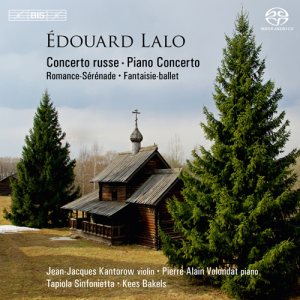 |
 |
|


alternatively
CD: MDT
AmazonUK
AmazonUS
Downloads from eclassical.com
|
Edouard LALO (1823-1892)
Concerto Russe, for violin and orchestra, op.29 [29:04]
Romance-Sérénade, for violin and orchestra
(1877) [5:47]
Fantaisie-Ballet, for violin and orchestra (1885) [9:00]
Guitare, for violin and orchestra, op.28 (orch. Gabriel Pierné)
[3:04]
Piano Concerto (1888) [23:38]
 Jean-Jacques Kantorow (violin)
Jean-Jacques Kantorow (violin)
Pierre-Alain Volondat (piano)
Tapiola Sinfonietta/Kees Bakels
rec. Concert Hall, Tapiola, Finland, May 2011
 BIS-SACD-1890
BIS-SACD-1890  [71:36]
[71:36]
|
|
|
This CD is a follow-up, tardy but gratifying, to BIS-CD-1680
(2009, review),
which featured most of the rest of Lalo's concertante works.
These included the French composer’s best-loved violin
concerto of sorts, the Symphonie Espagnole.
Next to that much-recorded work, the four-movement Concerto
Russe ('Russian') is rather disappointingly neglected by
violinists, even though it is, in effect, more of the same splendid
stuff, only less Spanish and a little more Russian! Written
like the Symphonie for Lalo's friend and inspiration,
the famous Spanish virtuoso Pablo de Sarasate, the Concerto
Russe had a bad start when Sarasate, for reasons no longer
known, would not perform it. Lalo wrote to him respectfully,
but pointing out "Nobody is infallible, and this time you are
wrong."
Despite the inclusion of genuine folk tunes in places, there
is nothing particularly Slavic about the Concerto - the overall
aesthetic is more Franco-Germanic, with the odd dash of Iberia
again. Whatever national colours are evoked, Lalo's writing
is unabashedly late-Romantic: highly lyrical, virtuosic, expressive,
rhetorical. Jean-Jacques Kantorow gives a typically breathtaking
account of the work, dialoguing telepathically with the orchestra
he has conducted for several years, and indicating strongly
that Sarasate was indeed wrong to give it a miss.
The Romance-Sérénade was written for another
violinist, Paul Viardot, and the emphasis is very much on the
soloist, who soliloquises romantically and brilliantly almost
non-stop, with the orchestra mainly colouring in the background.
Why concert violinists today do not make more of this audience-enchanter
is quite a mystery. Ditto the Fantaisie-Ballet, yet another
work Lalo dedicated to Sarasate. Its virtuosic nature and Spanish
dance rhythms must have appealed greatly to him too. Both works
are similar in mood and style to the two Romances for violin
and orchestra of Saint-Saëns, or indeed parts of his violin
concertos.
Lalo wrote the short Guitare for violin and piano, which
Gabriel Pierné later arranged very deftly for violin
and orchestra, the tambourine giving the work an even stronger
Spanish ambience. The Piano Concerto, Lalo's last major work,
opens with a heroic theme that sounds somehow famous, redolent
in spirit to Richard Addinsell's Warsaw Concerto or Shostakovich's
Assault on Beautiful Gorky - certainly not Schumann,
as Jean-Pascal Vachon suggests in his notes. Vachon writes that
the lack of a cadenza is a significant reason for its absence
from the repertoire, but perhaps it is simply that 20th-century
connoisseurs, performers and critics alike, think it too flamboyant
or even vulgar for it to have any real depth, consigning it
to the same fate as those meritorious specimens by Anton Rubinstein.
In fact, it is probably fair to say that the Piano Concerto
is no great masterpiece, certainly not in the same league as
those by Saint-Saëns, but it is an attractively energetic
and tuneful work that deserves an occasional concert outing,
especially when played with as much élan as Pierre-Alain
Volondat provides here.
The Tapiola Sinfonietta is a decent little orchestra, and has
made several impressive recordings for BIS, almost always conducted
by Jean-Jacques Kantorow. Their most recent together was released
earlier this year: Kalevi Aho's Chamber Symphonies (review).
Kees Bakels is probably better known as an opera conductor,
but he and the Sinfonietta give an appealing, if sometimes strait-laced
account of Lalo's music.
Rather surprisingly, sound quality is, for BIS at least, less
than immaculate: there is a perceptible lack of depth to the
strings that hints at lossiness. The drop is pretty small, however,
imperceptible in the three smaller works - perhaps the Piano
Concerto and Concerto Russe were recorded on a different
day. Older ears may not even notice, but the 'super audio' designation
seems in this case misplaced. The notes by Vachon, in English,
German and French, are detailed, informative and well written.
Byzantion
Collected reviews and contact at reviews.gramma.co.uk
|
|




 All Nimbus reviews
All Nimbus reviews








